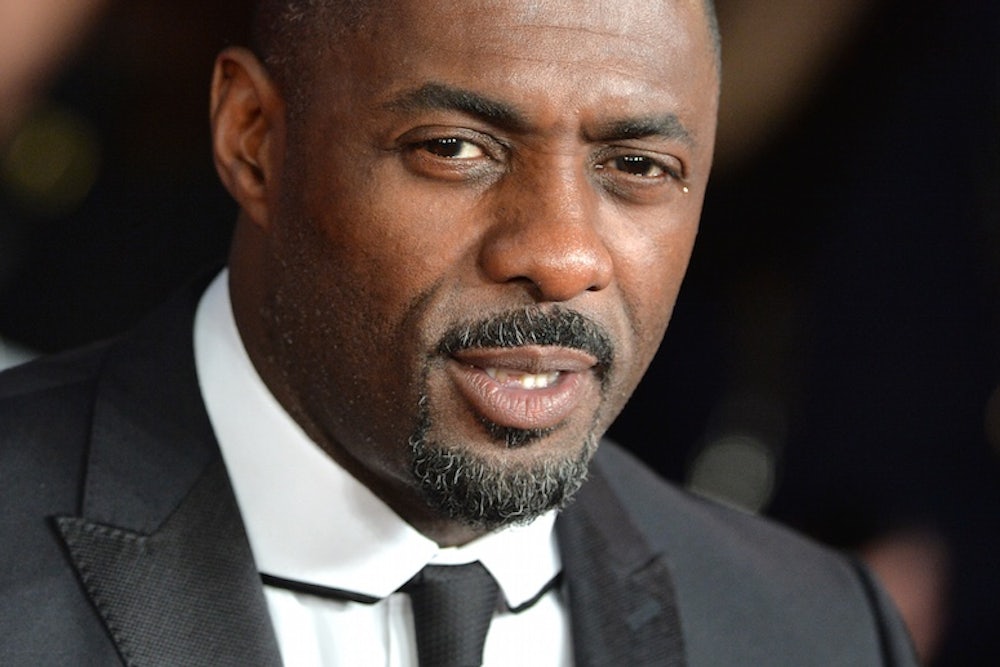For proof that an idea's time has come, look no further than Rush Limbaugh belching fire at it with the caveat, "I know it's racist to probably even point this out." In this case, Limbaugh's target was the gentle revelation, from emails churned up in the enormous Sony hack, that a head of the studio has stumped for Idris Elba to play James Bond once Daniel Craig goes out to pasture with Connery, Moore, Dalton and Brosnan. The news riled Limbaugh because Elba is black, and Ian Fleming's Bond "was white and Scottish. Period." But it would be simplistic to dismiss this view as the rant of a lone, right-wing loudmouth. On this issue, the only difference between Limbaugh and Hollywood is that he doesn't try to conceal his racial biases.
Anyone who watched Elba as Stringer Bell in "The Wire" would recognize he has a bearing fit for Bond. That show eschewed heroes and villains—everyone worth watching was at least a bit of both—but Bell, as one of the masterminds of the drug syndicate at the heart of the show, cut an imperious figure for a character who, to begin the series, was basically a middle manager. He has landed roles in larger films since (Prometheus, Thor and its sequel) but he passed the first test for a James Bond from the time he appeared in a Baltimore courtroom, as cool and magnetic as a brick of freshly printed hundred-dollar bills. He looked like someone you'd want to be.
Limbaugh was even more wrong than usual. If Bond were strictly white and Scottish, then every actor but one (the original, Connery) has violated the latter half of that rule. Even his insistence that Bond be white is such misguided strict-constructionist argument that it defies serious retort. There is not space enough on this page to cite every time a white actor has played a person of color, but here are a few notorious examples.
How curious, though, to find the likes of Rush advocating for business as usual in Hollywood. Truth is, the supposed bastion of liberal values is loath to entrust lead roles in big-budget productions to actors of color, even as audiences are increasingly multiethnic. In a recent Hollywood Reporter essay, Chris Rock rips the film industry as a product of a depressingly Rushlike mentality. "When it comes to casting, Hollywood pretty much decides to cast a black guy or they don't," he writes. "We're never on the 'short list.' We're never 'in the mix.' When there's a hot part in town and the guys are reading for it, that's just what happens."
The stats prove Rock right. Count the people of color who top the marquee in the top-grossing movies ever. Zoe Saldana was done up in digital blueface in Avatar, Samuel L. Jackson has a secondary role in The Avengers as well as in the latter Star Wars movies and Jurassic Park, Don Cheadle sidekicks in the Iron Man films, Eddie Murphy voices a donkey in the Shrek installments, and … that's about it until you get to Will Smith actually starring in Independence Day, nearly 20 years ago, sitting at No. 43 all-time (without considering inflation). Between Harry Potter, Transformers, Middle-Earth, Caribbean pirates, Batmen, Twilight, The Hunger Games, and, yes, two dozen Bond movies, the world's biggest franchises overwhelmingly are stocked with white performers.
I say this as a white male who reviews a movie a week: Taken in aggregate, the resulting product isn't just patronizing, it's junk not worth its price. In the New York Times, David Carr noted recently that box office grosses are down 4 percent from a year ago, and that Regal Entertainment, the country's biggest theater chain, saw profits dip 50 percent over the first nine months of 2014. Most big-budget spectaculars sag with ponderous sameness. When the Spider-Man franchise rebooted in 2012 with The Amazing Spider-Man, it sorely needed a raison d'être. After declining box office returns in the second and third installments, why not tweak it, perhaps as Marvel Comics did to replace Peter Parker when he died: with Miles Morales, a biracial teenager of black and Hispanic descent? Nah. We got Andrew Garfield. Charming, good-looking white guy with wavy hair. Won't rankle rednecks when smooching Emma Stone. But too safe a choice for a project that already felt reheated. His two movies so far have made the least money of the Spidey flicks.
Would a part-Hispanic hero have piqued audiences more? Who knows. But we can say that in 2013, according to the Motion Picture Association of America, Hispanics accounted for 25 percent of all the movie tickets sold in the U.S.-Canadian market, despite making up only 17 percent of the population. Black moviegoers slightly outpace their share of the population (13 percent of sales). The only group slacking, in fact, is white audiences: 63 percent of the population, 54 percent of the ticket sales. White-heavy casts have less to do with matching audience demographics, it would appear, and more about entrenched studio tendencies.
At least the torrent of comic-book movies in the pipes seems bound finally to release one with a black star: relative unknown Ray Fisher in a Cyborg movie—albeit, not until 2020. We'll also see Smith in Suicide Squad and Dwayne "The Rock" Johnson in Shazam. These guys are anything but scrubs. Johnson, for one, has turned up in the most recent Fast & Furious sequels, as part of an ensemble cast that looks like a box of crayons: Vin Diesel, Michelle Rodriguez, Tyrese Gibson, Ludacris, Sung Kang, half-Brazilian Jordana Brewster, and token white guy Paul Walker (R.I.P.). The six installments in that series have grossed $2.4 billion worldwide, placing the franchise among the richest ever. What more evidence does Hollywood need that diverse casts aren't box-office poison?
Correction: A previous version of this story suggested that Cyborg is a Marvel character. It's a DC Comics character.
